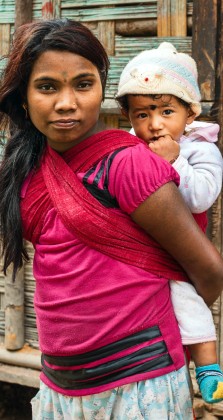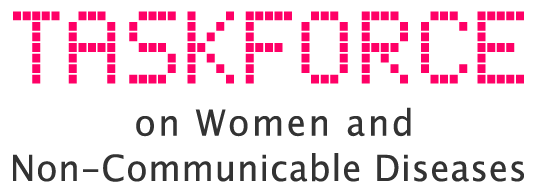The Taskforce on Women and NCDs brings together fourteen global health organizations from the women’s health and NCD communities to respond to the unique and growing burden of NCDs on women in low- and middle-income countries by mobilizing leadership, expanding technical expertise and disseminating evidence to inform policymaking, planning and services.
DOWNLOAD THE 1-PAGER
For more information: info@taskforcewomenandncds.org
Goals
The goals of the Taskforce on Women and NCDs are two-fold:
GOAL ONE: To develop and disseminate the information and evidence-based guidance that will allow public health leaders, national health planners and clinicians to integrate NCD prevention, detection and treatment into existing programs and services for women in low- and middle-income countries.
GOAL TWO: To mobilize national policymakers, public health leaders and civil society to advocate for national health policies and financing that drive a gender-specific and resource-specific response to NCDs in women.


Why Now?
Emergent health challenges are transforming the landscape of women’s health needs in most low- and middle-income countries. Demographic and lifestyle changes as well as globalization and urbanization are leading to a rapid increase in non-communicable diseases (NCDs) – cardiovascular disease, cancer, diabetes and chronic respiratory disease. The NCD epidemic poses a serious burden on women’s health, threatening the most vulnerable girls, women and communities that have been the focus of hard-fought health and development successes over the past decades. Approximately half of all female deaths in low- and middle- income countries are attributable to NCDs. NCDs impact women who are left exposed through persistent social, gender and economic inequalities and overall pervasive inequities in access to health information, appropriate access to care and life-saving technologies.
The landmark UN High-Level Meeting on the Prevention and Control of NCDs in September 2011 marked the beginning of increased global awareness and political commitment to take action on these diseases. The UN Secretary General’s Global Strategy for Women’s and Children’s Health highlights NCDs as part of an integrated approach to women’s health.
In order to best meet women’s evolving health needs, the NCD and women’s health communities must come together, establish a common language, and share best practices and lessons learned, as part of an expanded effort to ensure women’s health in developing countries. The Taskforce on Women and NCDs has been responding to the growing burden of NCDs on women by creating a platform for collaboration and producing relevant documents and tools since 2011.
About the Secretariat
The George Institute is a leading independent medical research institute established in India in 2007. We are part of a global family with major centres in Australia, China, India and the UK, and an international network of experts and collaborators. Our mission is to improve the health of millions of people worldwide, particularly those living in disadvantaged circumstances, by challenging the status quo and using innovative approaches to prevent and treat non-communicable diseases and injury.
In April 2022, The George Institute’s India office began hosting the Secretariat for the Taskforce on Women and NCDs. The Secretariat operates as an anchor and accountability body to take the Taskforce through its next phase of development and action. The Secretariat is the convenor and coordinator of the Taskforce, helping it to deliver on its mission to respond to the burden of non-communicable diseases on women.














